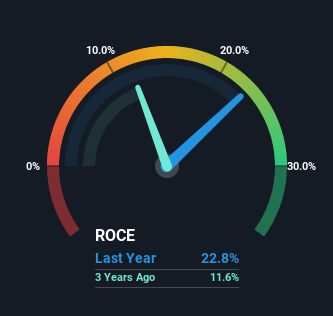- United Kingdom
- /
- Wireless Telecom
- /
- LSE:AAF
We Like Airtel Africa's (LON:AAF) Returns And Here's How They're Trending

There are a few key trends to look for if we want to identify the next multi-bagger. In a perfect world, we'd like to see a company investing more capital into its business and ideally the returns earned from that capital are also increasing. If you see this, it typically means it's a company with a great business model and plenty of profitable reinvestment opportunities. So when we looked at the ROCE trend of Airtel Africa (LON:AAF) we really liked what we saw.
Understanding Return On Capital Employed (ROCE)
For those who don't know, ROCE is a measure of a company's yearly pre-tax profit (its return), relative to the capital employed in the business. Analysts use this formula to calculate it for Airtel Africa:
Return on Capital Employed = Earnings Before Interest and Tax (EBIT) ÷ (Total Assets - Current Liabilities)
0.23 = US$1.6b ÷ (US$10b - US$3.1b) (Based on the trailing twelve months to June 2022).
Therefore, Airtel Africa has an ROCE of 23%. In absolute terms that's a great return and it's even better than the Wireless Telecom industry average of 9.7%.
Check out our latest analysis for Airtel Africa

Above you can see how the current ROCE for Airtel Africa compares to its prior returns on capital, but there's only so much you can tell from the past. If you're interested, you can view the analysts predictions in our free report on analyst forecasts for the company.
So How Is Airtel Africa's ROCE Trending?
The trends we've noticed at Airtel Africa are quite reassuring. The data shows that returns on capital have increased substantially over the last five years to 23%. The company is effectively making more money per dollar of capital used, and it's worth noting that the amount of capital has increased too, by 45%. The increasing returns on a growing amount of capital is common amongst multi-baggers and that's why we're impressed.
On a related note, the company's ratio of current liabilities to total assets has decreased to 30%, which basically reduces it's funding from the likes of short-term creditors or suppliers. So shareholders would be pleased that the growth in returns has mostly come from underlying business performance.
In Conclusion...
All in all, it's terrific to see that Airtel Africa is reaping the rewards from prior investments and is growing its capital base. Since the stock has returned a staggering 164% to shareholders over the last three years, it looks like investors are recognizing these changes. Therefore, we think it would be worth your time to check if these trends are going to continue.
Like most companies, Airtel Africa does come with some risks, and we've found 1 warning sign that you should be aware of.
If you'd like to see other companies earning high returns, check out our free list of companies earning high returns with solid balance sheets here.
New: Manage All Your Stock Portfolios in One Place
We've created the ultimate portfolio companion for stock investors, and it's free.
• Connect an unlimited number of Portfolios and see your total in one currency
• Be alerted to new Warning Signs or Risks via email or mobile
• Track the Fair Value of your stocks
Have feedback on this article? Concerned about the content? Get in touch with us directly. Alternatively, email editorial-team (at) simplywallst.com.
This article by Simply Wall St is general in nature. We provide commentary based on historical data and analyst forecasts only using an unbiased methodology and our articles are not intended to be financial advice. It does not constitute a recommendation to buy or sell any stock, and does not take account of your objectives, or your financial situation. We aim to bring you long-term focused analysis driven by fundamental data. Note that our analysis may not factor in the latest price-sensitive company announcements or qualitative material. Simply Wall St has no position in any stocks mentioned.
About LSE:AAF
Airtel Africa
Provides telecommunications and mobile money services in Nigeria, East Africa, and Francophone Africa.
High growth potential slight.
Similar Companies
Market Insights
Community Narratives



